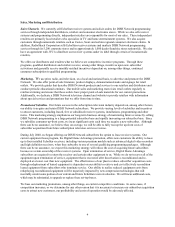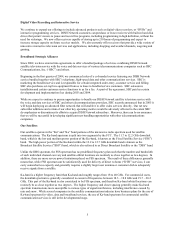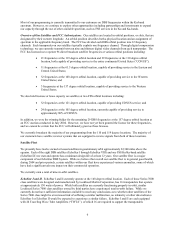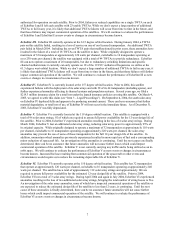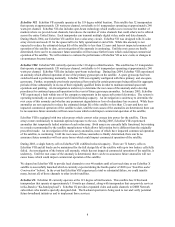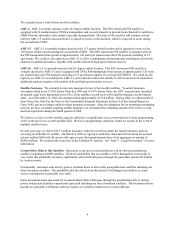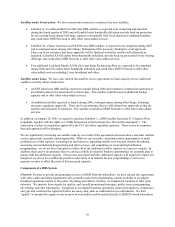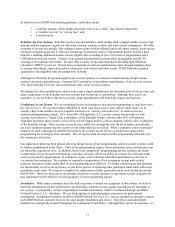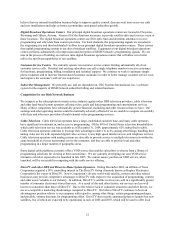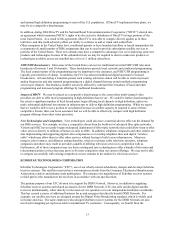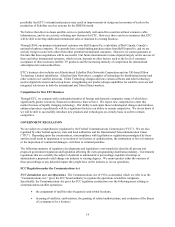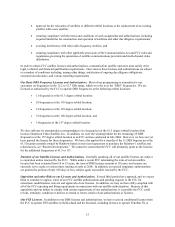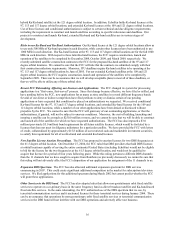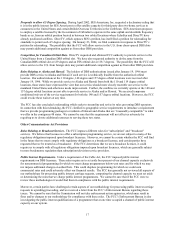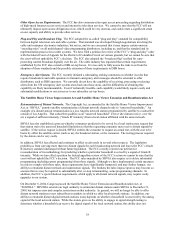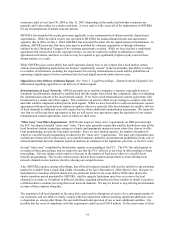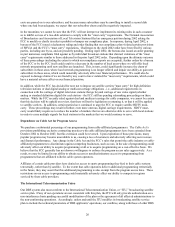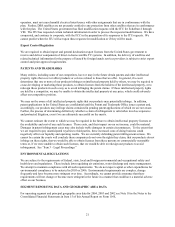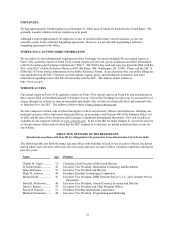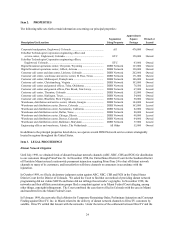Dish Network 2004 Annual Report Download - page 22
Download and view the complete annual report
Please find page 22 of the 2004 Dish Network annual report below. You can navigate through the pages in the report by either clicking on the pages listed below, or by using the keyword search tool below to find specific information within the annual report.14
possibility that ETC’s international projects may result in improvements in design and economies of scale in the
production of EchoStar receiver systems for the DISH Network.
We believe that direct-to-home satellite service is particularly well-suited for countries without extensive cable
infrastructure, and we are actively soliciting new business for ETC. However, there can be no assurance that ETC
will be able to develop additional international sales or maintain its existing business.
Through 2004, our primary international customer was Bell ExpressVu, a subsidiary of Bell Canada, Canada’s
national telephone company. We currently have certain binding purchase orders from Bell ExpressVu, and we are
actively trying to secure new orders from other potential international customers. However, we cannot guarantee at
this time that those negotiations will be successful. Our future international revenue depends largely on the success of
these and other international operators, which in turn, depends on other factors, such as the level of consumer
acceptance of direct-to-home satellite TV products and the increasing intensity of competition for international
subscription television subscribers.
ETC’s business also includes our Atlanta-based EchoStar Data Networks Corporation and our UK-based Eldon
Technology Limited subsidiaries. EchoStar Data Networks is a supplier of technology for distributing Internet and
other content over satellite networks. Eldon Technology designs and tests various software and other technology
used in digital televisions and set-top boxes, strengthening our product design capabilities for satellite receivers and
integrated televisions in both the international and United States markets.
Competition for Our ETC Business
Through ETC, we compete with a substantial number of foreign and domestic companies, many of which have
significantly greater resources, financial or otherwise, than we have. We expect new competitors to enter this
market because of rapidly changing technology. Our ability to anticipate these technological changes and introduce
enhanced products expeditiously will be a significant factor in our ability to remain competitive. We do not know if
we will be able to successfully introduce new products and technologies on a timely basis in order to remain
competitive.
GOVERNMENT REGULATION
We are subject to comprehensive regulation by the Federal Communications Commission (“FCC”). We are also
regulated by other federal agencies, state and local authorities and the International Telecommunication Union
(“ITU”). Depending upon the circumstances, noncompliance with legislation or regulations promulgated by these
entities could result in suspension or revocation of our licenses or authorizations, the termination or loss of contracts
or the imposition of contractual damages, civil fines or criminal penalties.
The following summary of regulatory developments and legislation is not intended to describe all present and
proposed government regulation and legislation affecting the video programming distribution industry. Government
regulations that are currently the subject of judicial or administrative proceedings, legislative hearings or
administrative proposals could change our industry to varying degrees. We cannot predict either the outcome of
these proceedings or any potential impact they might have on the industry or on our operations.
FCC Regulation under the Communications Act
FCC Jurisdiction over our Operations. The Communications Act of 1934, as amended, which we refer to as the
“Communications Act,” gives the FCC broad authority to regulate the operations of satellite companies.
Specifically, the Communications Act gives the FCC regulatory jurisdiction over the following areas relating to
communications satellite operations:
• the assignment of satellite radio frequencies and orbital locations;
• licensing of satellites, earth stations, the granting of related authorizations, and evaluation of the fitness
of a company to be a licensee;


